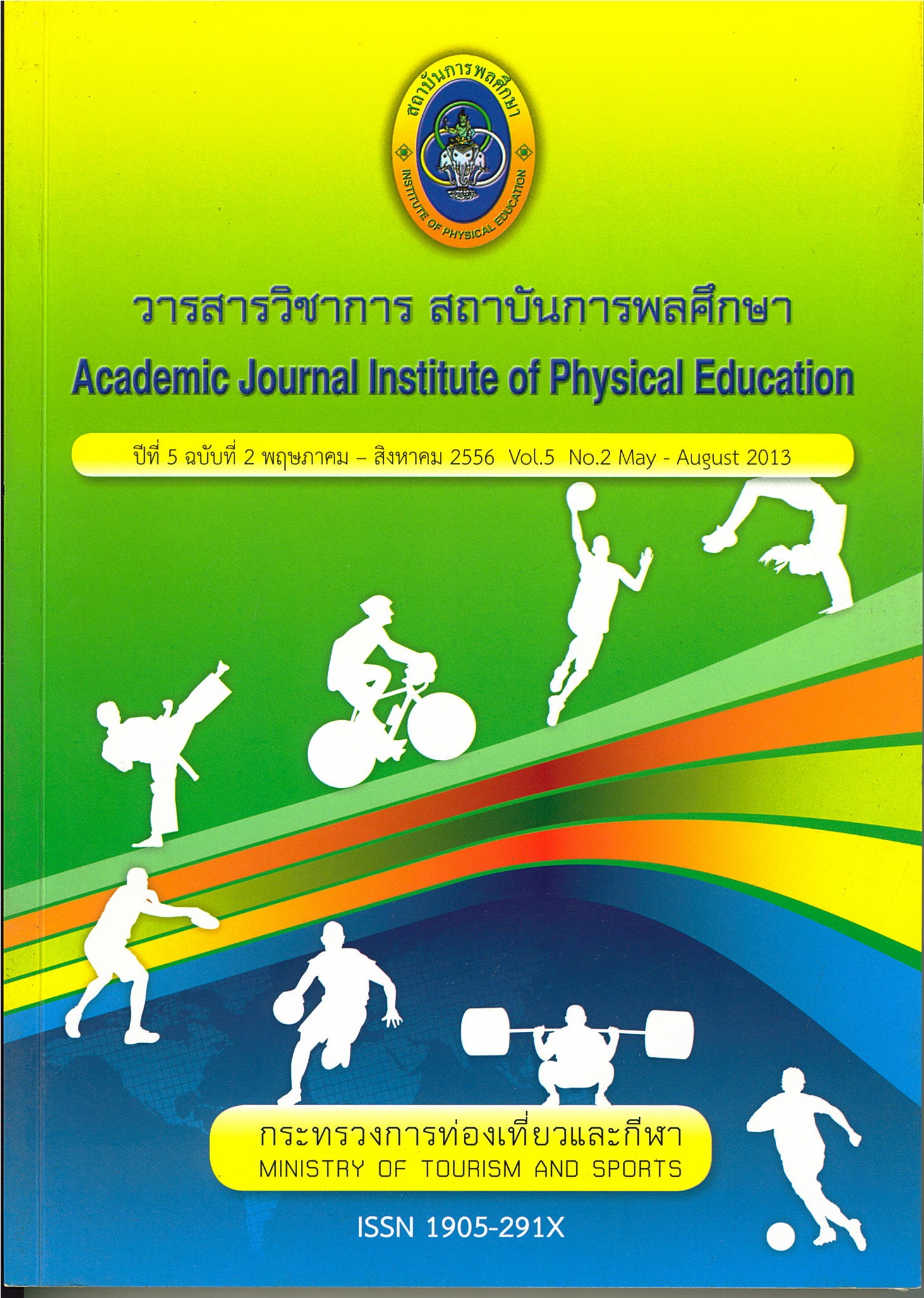Instructional Model for Developing on Physical Education Complex Skills' Performance of The Institute of Physical Education Students
Main Article Content
Abstract
The purposes of this research were: 1) To investigate the components of physical education complex skills and factors affecting physical complex skills performance; 2) To develop and examine the outcomes of the instructional model for developing physical education complex skills performance of the Institute of Physical Education students, and 3) To explore students' opinions toward the instructional model. This research employed a mix-method research approach. The researcher the study into 3 phases as follows. Phase 1: Investigation of the components of physical education complex skills and factors affecting physical education complex skill performance of the Institute of Physical Education students, using Delphi Technique with 17 experts, and causal relationship analysis. The data was collected from 300 teachers and instructors of the Institute of Physical Education, using a 5-point scale questionnaire, and analyzed with the LISREL Version 8.8. Phase 2: Development and examination of the outcomes of
instructional model for developing physical education complex skills performance of the Institute of Physical Education students, following the innovative development phrases. The instructional model was assessed by 8 experts, and was later tried out in the sample students of Institute of Physical Education, totally 60 participants who were arranged into 2 groups with 30 participants in each of the control group and experimental group, using simple random sampling method. The try out was conducted for 2
weeks, 1 day perweek, 3 hours per day, making totally 6 hours. Phase 3: Exploring students' opinions towards this instructional model developed by the researcher, using a 5-point rating scale questionnaire with 30 participants of the experimental group.
Results
Phase 1: The components of complex physical education skills comprise body movement, types of movement, patterns of movement, stages of movement, direction of movement, particular movement, and serial of movement. These components displayed good fit to the empirical data, with factor loadings ranged between 0.34 - 0.66. Factors affecting the practice of physical education complex skills performance include 4 aspects, i.e. intellectual, psychological, practical, and physical aspects. The causal relationship model exhibited good fit to the empirical data, with X- - 208.08, p-value = 0.16486, df = 258, CFI = 1.000, RMSEA = 0.017, and coefficient of determination of dependent variables (R?), i.e. complex physical education skills = 0.66.
Phase 2: The instructional model consisted of 6 phases of instructional activities, i.e. 1) motivation and readiness; 2) perception motor skills; 3) imagery; 4) performance skills; 5) feedback and adaptation performance skills; and 6) conclusion and health performance. As a result of tested model, students scored higher on the knowledge of skill performance for somersault jump kick takraw model at post-test with the developed instructional model than with regular instruction, with statistical significance level of .05. Students also scored higher on skills performance for somersault jump kick takraw model at post-test with the developed instructional model than with regular instruction, with statistical significance level of .05.
Phase 3: Results suggested that students displayed high level of opinions towards the developed model in every of the cognitive, psychological, practical, and physical aspects. In overall, students reflected high level of opinions towards the model developed by the researcher.
Article Details
The published article is a copyright of the Academic Journal of Thailand National Sports University. The passage appeared in each article in this academic journal is a perspective of each author which is not related to the journal. Each author is required to be responsible for all components of his/her own article. If there are any mistakes, each author must be responsible for those mistakes on his/her own.
References
ทิศนา แขมมณี. (2548). ศาสตร์การสอน : องค์ความรู้เพื่อการจัดกระบวนการเรียนรู้ที่มีประสิทธิภาพ. พิมพ์ครั้งที่ 4. กรุงเทพฯ: ด่านสุทธาการพิมพ์ จํากัด.
วรศักดิ์ เพียรชอบ. (2548), รวมบทความเกี่ยวกับปรัชญา หลักการ วิธีสอนและการวัดเพื่อประเมินผลทางพลศึกษา. กรุงเทพฯ: สํานักพิมพ์แห่งจุฬาลงกรณ์มหาวิทยาลัย.
ศิลปชัย สุวรรณธาดา. (2548). การเรียนรู้ทักษะการเคลื่อนไหว : ทฤษฎีและปฏิบัติการ. กรุงเทพฯ สํานักวิชาการวิทยาศาสตร์การกีฬา,
จุฬาลงกรณ์มหาวิทยาลัย สมบัติ กาญจนกิจ และสมหญิง จันทรุไทย. (2542), จิตวิทยาการกีฬา แนวคิด ทฤษฎีสู่การปฏิบัติ- กรุงเทพฯ: ด่านสุทธาการพิมพ์ จํากัด.
Bucher, C. A. (1975). Foundation of Physical Education. New York : The C.V. Mosby Company.
Morris, T.; Spittle, M., & Watt, A. P. (2005). Imagery in Sport. Champaign, IL: Human Kinetics.

